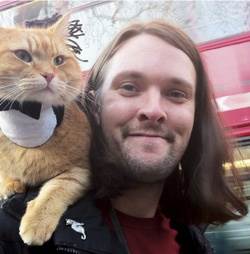James Bowen writes about sleeping rough in London and how meeting Bob changed his life
Published on: 05 October 2015
 'How did you end up homeless, living on the streets?'
'How did you end up homeless, living on the streets?'
When I was sleeping rough in London in my twenties I was asked something similar on an almost daily basis.
The enquiries were almost always well-meaning. Yet there was often a judgmental edge to people's questions too. I could sense many felt it must be my fault; that I had done something wrong, or even worse, that there was something abnormal about me, that I had chosen to live this way. Of course I hadn't. Who would?
Homelessness is never straightforward. People end up on the streets for all sorts of reasons, from financial hardship to mental health issues, drugs to domestic problems. In my case, I was a rebellious youth who fell into bad habits - literally. I'd come to London from Australia with dreams of becoming a musician. But after I was asked to leave the home I shared with my stepsister, I ran out of friends who had floors where I could rest my head for the night. Sleeping rough was my only option. Frightened and friendless, I became dependent on drugs. My downward spiral began there. I am lucky to be alive.
It was only when I came across a stray ginger cat, Bob, in the Spring of 2007 that I began to turn my life around. Caring for him gave me a direction, a purpose. Most importantly, Bob gave me hope. In 2012, working with the writer Garry Jenkins, I told our story in the book A Street Cat Named Bob. It touched a chord with people, many of whom thanked me for shining a light on the lives of those who fall through the cracks of society. This was particularly gratifying. I felt I'd communicated something worthwhile, that I'd made a difference. So when Garry and I were offered the chance to write a picture story book for young children, we saw an opportunity to present some of these same themes to a new audience.
But how to make this complex and adult subject digestible for a pre-school audience?
The obvious answer presented itself in the form of Bob. When I met Bob in 2007 he was homeless too. It was, I think, one of the reasons we bonded so quickly. We were two lost souls, two broken toys, if you like. We helped mend each other. Yet Bob was a mystery. I still don't know where he came from and how he found his way to my doorstep.
So in My Name is Bob Garry and I imagined Bob's early life. We explored how he came to end up on the streets, and how he survived there. The question we wanted to pose was: If someone as loveable, innocent, and yes, normal, as Bob can end up homeless and friendless on the streets then what is to stop anyone suffering a similar fate?
We, of course, hope that our young readers are entertained, moved and, ultimately, charmed by Bob's tale. In many ways, it's a simple tale of triumph over adversity. But we also hope that his story remains with them. One day, we hope, when they come across someone like the younger me, sleeping in a doorway, they won't assume that he or she is an abnormal guy who has chosen to be there. Because, I can assure you, he won't have.






Add a comment